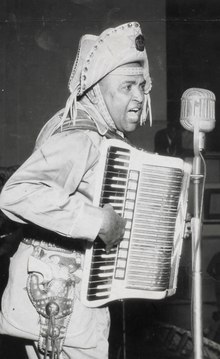Luiz Gonzaga | |
|---|---|
 Gonzaga in 1957 | |
| Background information | |
| Birth name | Luiz Gonzaga do Nascimento |
| Born | December 13, 1912 Exu, Pernambuco, Brazil |
| Died | August 2, 1989 (aged 76) Recife, Pernambuco, Brazil |
| Genres | |
| Occupations |
|
| Instruments | |
| Years active | 1940–1989 |
| Labels | RCA, EMI-Odeon, Discos Copacabana |
| Website | http://www.gonzagao.com.br/ |
Luiz Gonzaga do Nascimento (standard orthography 'Luís'; Portuguese pronunciation: [luˈiz ɡõˈzaɡɐ]; December 13, 1912 – August 2, 1989)[1] was a Brazilian singer, songwriter, musician and poet and one of the most influential figures of Brazilian popular music in the twentieth century. He has been credited with having presented the rich universe of Northeastern musical genres to all of Brazil, having popularized the musical genre baião and has been called a "revolutionary" by Antônio Carlos Jobim.[2] According to Caetano Veloso, he was the first significant cultural event with mass appeal in Brazil.[3] Luiz Gonzaga received the Shell prize for Brazilian Popular Music in 1984 and was only the fourth artist to receive this prize after Pixinguinha, Antônio Carlos Jobim and Dorival Caymmi. The Luiz Gonzaga Dam was named in his honor.[4][5][6]
Gonzaga's son, Luiz Gonzaga do Nascimento Jr, known as Gonzaguinha (1945–1991), was also a noted Brazilian singer and composer.
- ^ Cite error: The named reference
amwas invoked but never defined (see the help page). - ^ "Luiz Gonzaga". almanaquebrasil.com.br (in Brazilian Portuguese). Archived from the original on February 5, 2014. Retrieved February 5, 2014.
- ^ "Sertão Gonzaga - Biografia". diariodepernambuco.com.br (in Brazilian Portuguese). Archived from the original on December 17, 2012. Retrieved February 13, 2014.
- ^ "Descrição do Aproveitamento de Luíz Gonzaga" [Description of Utilization of Luiz Gonzaga] (in Brazilian Portuguese). CHESF. Archived from the original on July 6, 2011. Retrieved September 9, 2010.
- ^ "Luiz Gonzaga". BBC Music. BBC. Archived from the original on April 7, 2010. Retrieved September 9, 2010.
- ^ "A DANCE FOR ALL". recife.pe.gov.br. Municipality of Recife – Brazil. Archived from the original on November 26, 2002. Retrieved September 9, 2010.